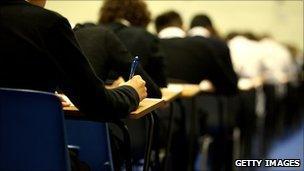Pisa tests show pupils in Wales falling behind
- Published

Pisa is an international standardised assessment for 15-year-olds
The Welsh education minister says schools "are simply not delivering well enough" after results of worldwide tests on reading, maths and science.
The Pisa assessments of 15-year-olds show Wales falling further behind since the 2006 tests.
Wales teenagers ranked below average, alongside the Czech Republic, in reading.
Leighton Andrews called the results "unacceptable" and said everyone involved should be "alarmed".
Wales again ranked lowest of the UK countries and is now cast adrift from England, Scotland and Northern Ireland.
Out of 67 countries taking part, Wales was ranked 38th for reading, 40th for maths and 30th for the tests for science.
Scotland was the best for reading and maths of the UK nations, ranked 15th and 21st, while England was top for science in the UK, ranked 16th.
It is now below average on all three measures and has scored worse than before in every category.
Up to 10,000 15-year-olds are tested by the Organisation for Economic Co-operation and Development (OECD) in reading, maths and science.
The Programme for International Student Assessment (Pisa) tests are designed to measure whether students nearing the end of secondary school are well prepared to meet the challenges they will encounter in future life.
China, South Korea and Finland dominated the upper rankings while Peru, Kyrgyzstan and Azerbaijan propped up the tables.
In 2006, Wales scored average results for science and below average for maths and reading.
However, the latest tests, which were conducted in 2009, show the country is now below average on all three measures and has scored worse than before in every category.
By contrast the scores of the other UK countries are either average or above average.
Education Minister Leighton Andrews said: "These results are disappointing. They show an unacceptable fall in our overall performance - everyone involved in the education sector in Wales should be alarmed.
"There can be no alibis and no excuses. Countries with less money spent on education than Wales have done better than Wales.
"Schools, local authorities, and ourselves as government need to look honestly at these results and accept responsibility for them."
He said the results had "made it clear that schools in Wales are simply not delivering well enough for students at all levels of ability".
"This can only be described as a systemic failure; we all share responsibility for this and we must equally share in the difficult task of turning things around," he added.
"The young people of Wales have the same potential as young people across the world. We need to refocus on higher standards, set our ambitions and expectations high and look for improvement in every aspect of our system.
"Let me be clear - we need to address this as a matter of absolute urgency. It requires honesty, leadership and a new approach to accountability."
Michael Davidson from the OECD said Wales' performance showed the country faced a challenge compared to the rest of the UK.
"[Wales is] performing at about the same level in reading as the Slovak Republic and the Czech Republic, below the average," he said.
"I'm sure Wales would want to perform better than that."
With performance falling further behind the rest of the UK, the results may make uncomfortable reading for the assembly government.
David Reynolds, professor of education at Plymouth University, said the country had good schools but lacked consistency.
"It's not that we don't know how to educate children, it's just that we don't do it reliably across the system," he said.
The results are likely to renew calls from teaching unions to close the funding gap, which sees £527 more spent per pupil in England than in Wales.
However, Mr Davidson said the UK tends to be one of the highest spenders per student.
"There are only six countries in the OECD that spend more per students than in the UK," he said.
"We know there isn't a particularly strong relationship between levels of expenditure and performance.
"What's more important and is very evident from the data is how that money is spent."
Chris Keates, general secretary of the NASUWT teaching union condemned Mr Andrews for trying to lay the blame on classroom complacency.
"We had been assured that the minister would reflect on the results rather than enter the 'blame game'", he said.
"The NAS/UWT is willing to work with the assembly to take stock of the results and to assess what needs to be done if improvement is to be realised."
NUT Wales secretary David Evans said the schools effectiveness framework, introduced after the last Pisa results, needed to be given time and it was "vitally important" all those involved agreed on a way forward to address the deficiencies.
"We are all able to speculate on the reasons for this failure and we are sure that many column inches will be written about the funding gap, inadequate continuing professional development (CPD) opportunities, leadership issues, performance management, best practice and disruptive behaviour," he said.
Education union ATL Cymru said the "very disappointing" results should not lead to "knee-jerk reactions or quick fixes" that will "make matters worse".
The union said everyone with an interest in academic standards should work together to find "effective and lasting solutions".
Welsh Conservative education spokesperson Paul Davies said the "damning figures" were a wake-up call to the assembly government.
"Wales' dramatic educational decline suggests that Labour-Plaid's overly-centralised and bureaucratic management of schools is letting down a generation of pupils, parents and teachers," he said.
Lib Dem education spokeswoman Jenny Randerson said the results were "disastrous" and blamed underfunding of schools and the spending gap between England and Wales.
"It is simply not acceptable for Estonia and Latvia to be out performing Wales in mathematics, for example," she said.
"This is not just bad for individual children but a blow for our hopes of boosting growth in the economy."
- Published7 December 2010
- Published2 November 2010